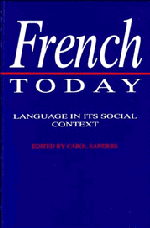Book contents
- Frontmatter
- Contents
- List of figures and maps
- List of tables
- Notes on the contributors
- Acknowledgements
- Introduction
- 1 French: a planned language?
- 2 Sociosituational variation
- 3 Regional variation in France
- 4 The other languages of France: towards a multilingual policy
- 5 The migrant languages of Paris
- 6 Gender and language in French
- 7 The reform of the writing system
- 8 Alternative French
- 9 New words for new technologies
- 10 Language and style in politics
- 11 French and French-based Creoles: the case of the French Caribbean
- 12 French in Africa
- 13 French in Canada
- 14 Sociolinguistic variation and the linguist
- Bibliography
- Index
Introduction
Published online by Cambridge University Press: 05 June 2012
- Frontmatter
- Contents
- List of figures and maps
- List of tables
- Notes on the contributors
- Acknowledgements
- Introduction
- 1 French: a planned language?
- 2 Sociosituational variation
- 3 Regional variation in France
- 4 The other languages of France: towards a multilingual policy
- 5 The migrant languages of Paris
- 6 Gender and language in French
- 7 The reform of the writing system
- 8 Alternative French
- 9 New words for new technologies
- 10 Language and style in politics
- 11 French and French-based Creoles: the case of the French Caribbean
- 12 French in Africa
- 13 French in Canada
- 14 Sociolinguistic variation and the linguist
- Bibliography
- Index
Summary
This collection seeks to present a profile of the contemporary French language in its social context, through a discussion of certain key issues relating to language in both France and the French-speaking world. The chapters, all by specialists from Britain or France, divide into two categories: some (like chapter 3) give an overview of work done in a particular area, others (like chapter 12) choose to go into greater depth about a specific aspect of what may be a vast field. A number of themes recur in the book. One is the question of how to represent, analyse and interpret data relating to language varieties that have long been marginalised, and have not been properly codified or documented (chapters 1 and 2). Another concerns the way in which French, sometimes despite a number of obstacles, is adapting to the future, whether as a language of new technology in France (chapter 9), or as a vehicular language on another continent (chapter 12).
France's linguistic history has been characterised by attempts to impose uniformity. The goal remained the same, even when the ideology varied: while the French monarchy may have seen centralism (linguistic and cultural, as well as political and administrative) as a way of extending and maintaining power, the revolutionaries appealed to democratic principles, urging that:
Chez un peuple libre, la langue est une et la même pour tous.
(Barrère 1794, quoted in Bronckart 1988)- Type
- Chapter
- Information
- French TodayLanguage in its Social Context, pp. 1 - 6Publisher: Cambridge University PressPrint publication year: 1993
- 2
- Cited by

